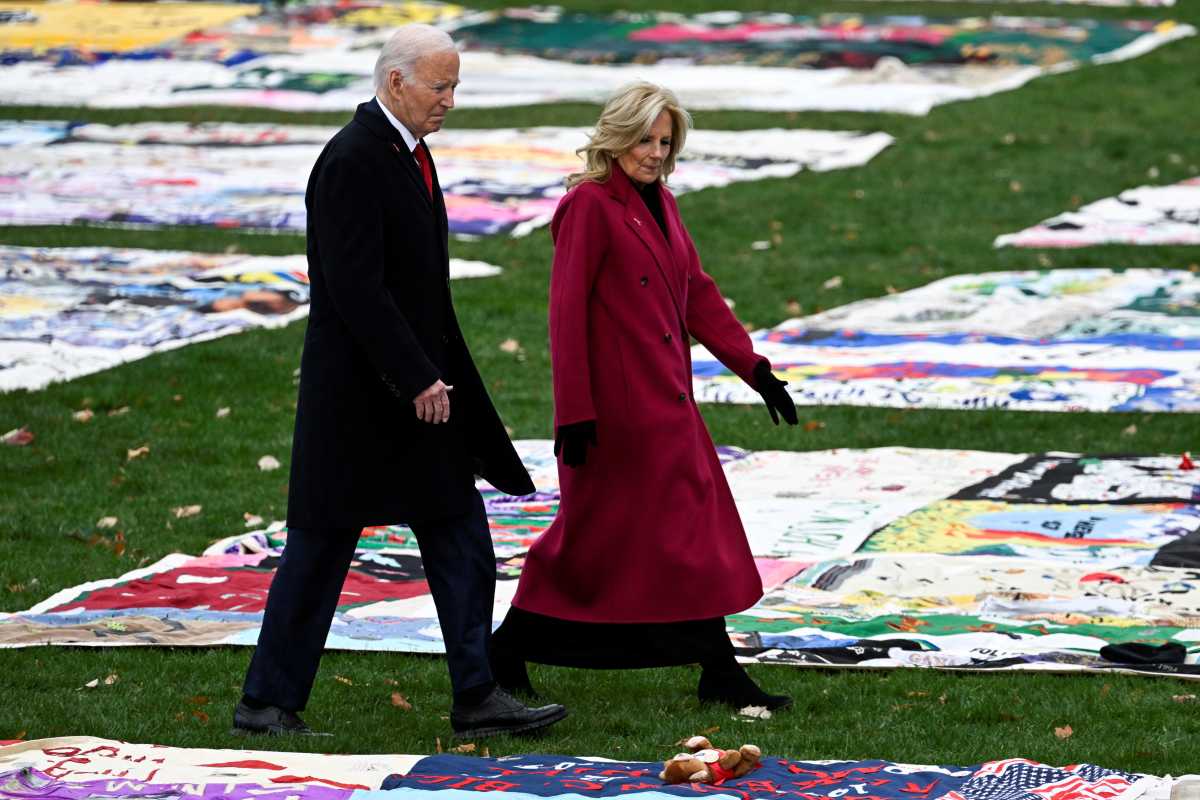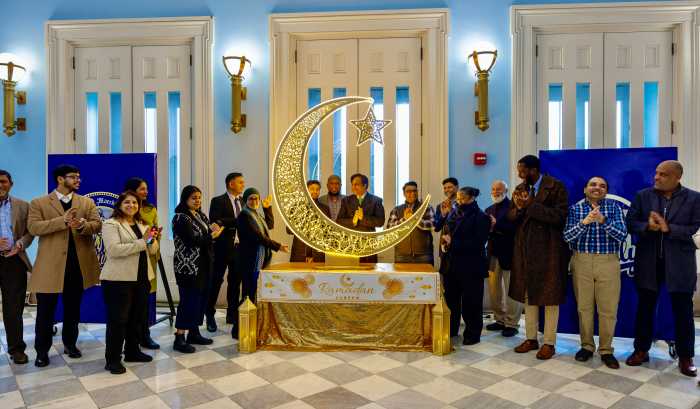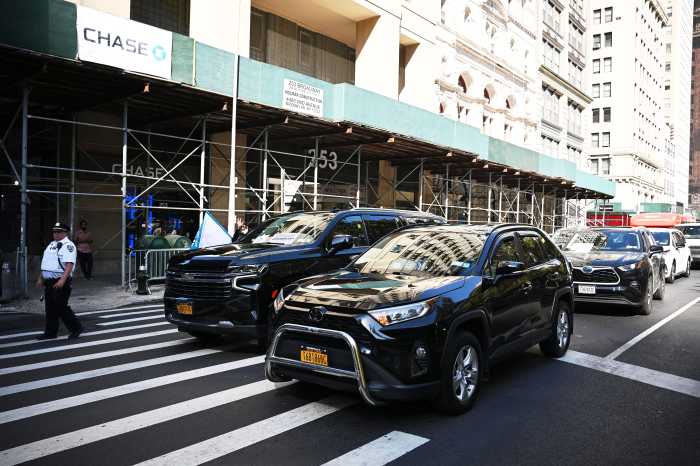President Joe Biden commemorated World AIDS Day at the White House on Dec. 1 alongside First Lady Jill Biden and HIV/AIDS advocates.
The event took place on the South Lawn against the sprawling backdrop of the NAMES Project AIDS Memorial Quilt, which contains, in total, tens of thousands of cloth panels honoring the lives of individuals lost to AIDS.
The AIDS Memorial Quilt has a long history in Washington, DC, but this marks its first appearance on the South Lawn. More than three decades ago — in 1987 — the quilt was laid out on the National Mall for the first time. In 1988, more than 8,000 panels of the quilt went on display in front of the White House, according to the National AIDS Memorial.
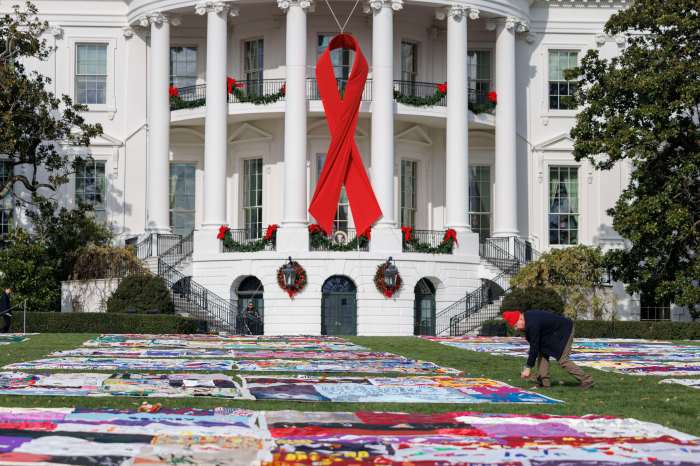
“Today, for the first time in our nation’s history, the sections of AIDS quilts are being publicly displayed here at the White House because, like the first threads of this quilt stretched nearly 40 years ago — stitched nearly 40 years ago, this movement is fully woven into the fabric and history of America, shining a light on the memory and the legacy of all the sisters and brothers, sons and daughters, husbands and wives, moms and dads, partners and friends who have lost — who we’ve lost to this terrible disease,” Biden said.
The first lady channeled the emotional impact of the AIDS Memorial Quilt as she remembered the lives of individuals lost to AIDS.
“And as I look at this beautiful quilt, with its bright colors, the names in big block letters, renderings of lives and loves, I see it as a mom,” Jill Biden said. “And I think of the mothers who stitched their pain into a patchworked panel so the world would remember their child not as the victim of a vicious disease but as a son who had played in the high school jazz band, as the child who grew up to proudly serve our nation in uniform, as the daughter whose favorite holiday was Christmas.”
The event featured Jeanne White-Ginder, the mother of Ryan White, a boy who lived with HIV/AIDS and drew national attention — and stigma — when he was barred from attending school before his death in 1990. White’s story led to the Ryan White CARE Act of 1990, a federal program providing HIV treatment and care.
“In 1990, however, shortly after Ryan died, Sen. [Ted] Kennedy asked me if I would come to Washington to explain to senators how vital it was to pass the AIDS bill which had been recently named after my son, called the — for my son, called the Ryan White CARE Act,” White-Gardner said. “He said I was something much more powerful than a lobbyist: I was a mother. I am sure that Dr. Biden can relate. Needless — needless to say, I went. I went to DC.”
She added: “The first senator I met getting off the elevator at the Capitol was Sen. Joe Biden. With tears in his eyes, he told me that he had lost his child, and that the only way that he had found to deal with it was through grief — through a purpose. In many ways, personal grief has fueled the AIDS movement since the beginning. Both Republicans and Democrats in Congress have supported Ryan’s bill, and as a result, countless lives have been saved.”
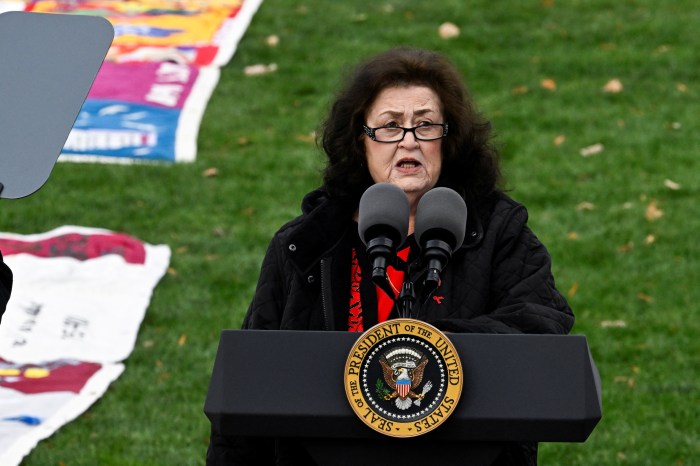
President Biden pointed to the Ryan White CARE Act and other federal initiatives, such as the President’s Emergency Plan for AIDS Relief (PEPFAR) — a program designed to combat HIV/AIDS internationally — as he underscored the importance of supporting the fight against HIV/AIDS.
During his own remarks, Biden said he would encourage Congress to pass a five-year reauthorization of PEPFAR. He also said the Centers for Medicare and Medicaid Services will issue new guidance on HIV care to encourage states to “adopt the best practices using the latest science and technology.”
Biden said he and the first lady met over the summer with Elton John and his husband, David Furnish. The World AIDS Day event, Biden said, “is, in no small part, the result of that meeting.”
The event came just weeks before the return of the President-elect Donald Trump, who redirected funds from the Ryan White AIDS CARE Act to pay for his migrant family separation policy during his first term. He also proposed to cut back on PEPFAR.
World AIDS Day, meanwhile, looked completely different during the Trump era. In a World AIDS Day speech in 2018, then-Vice President Mike Pence never bothered to acknowledge the LGBTQ community. And instead of pointing to the federal programs in the fight against HIV/AIDS, Pence highlighted the Trump administration’s $100 million investment into faith-based organizations to fight HIV/AIDS.

